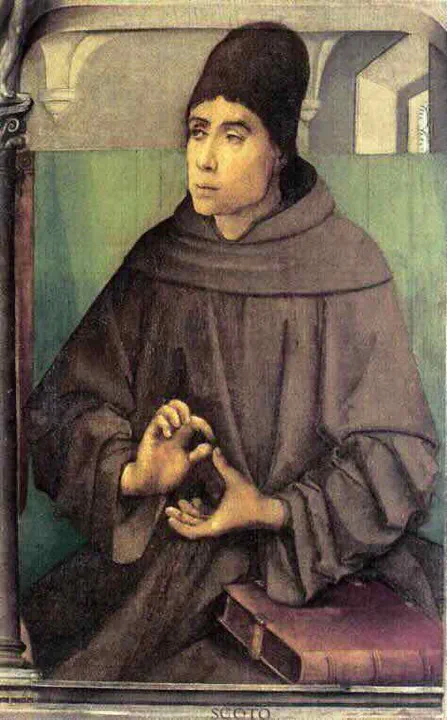- January 1, 1
John Duns Scotus OFM, “Duns the Scot”; (c. 1265/66 – 8 November 1308) was a Scottish Catholic priest and Franciscan friar, university professor, philosopher and theologian. He is one of the four most important Christian philosopher-theologians of Western Europe in the High Middle Ages, together with Thomas Aquinas, Bonaventure and William of Ockham.
His date of birth is believed to have been sometime between 23 December 1265 and 17 March 1266.
Duns Scotus died unexpectedly in Cologne in November 1308; the date of his death is traditionally given as 8 November. He is buried in the Church of the Friars Minor there.
John Duns Scotus, is known for his contributions to scholastic philosophy and theology, particularly within the Franciscan tradition. Some key points about his life and legacy include:
Philosophical Contributions: Duns Scotus made significant contributions to metaphysics, ethics, and epistemology. He was known for his subtle and complex philosophical arguments, which earned him the nickname “Doctor Subtilis” (the Subtle Doctor). His work had a profound impact on medieval scholasticism.
Duns and the Term “Dunce”: The term “Duns” or “dunce” originated as a reference to followers of Duns Scotus and his intricate, often highly nuanced arguments. Over time, the term evolved to refer to someone perceived as slow or incapable of learning. It was a later, pejorative use of the term and is not a fair representation of Duns Scotus’s intellectual contributions.
Beatification: John Duns Scotus was beatified by Pope John Paul II in 1993. Beatification is a step in the process of canonization in the Catholic Church, recognizing individuals for their contributions to the faith and their holy lives.

 ← Allan Ramsay's First regular public theatre in Scotland opened in Carrubbers Close, Edinburgh
← Allan Ramsay's First regular public theatre in Scotland opened in Carrubbers Close, Edinburgh Captain Ian C. Cameron, a bagpiper, composer, and author dies, Edinburgh →
Captain Ian C. Cameron, a bagpiper, composer, and author dies, Edinburgh →